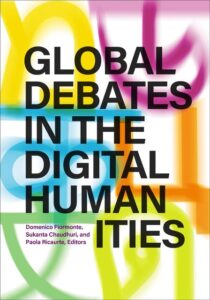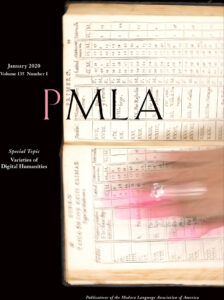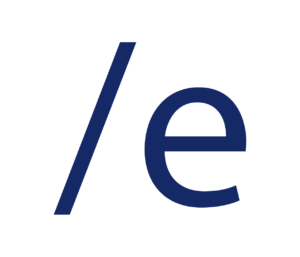Suggested Readings: Intro to DH
This page provides a curated list of suggested readings for an introduction to DH.
See our DH Community Announcements – Publications page for recently published articles, chapters, digital resources, etc.
- "What Is Digital Humanities and What's It Doing in English Departments?" by Matthew Kirschenbaum. Debates in the Digital Humanities, 2012.
- "A Gentle Introduction to XML" from the Text Encoding Initiative (TEI).
- "Digital Humanities Overview" by Johanna Drucker. The Digital Humanities Coursebook: An Introduction to Digital Methods for Research and Scholarship, 2021.
- "The History of Humanities Computing" by Susan Hockey. A Companion to Digital Humanities, 2004.
- "The Gates of Hell: History and Definition of Digital | Humanities | Computing" by Edward Vanhoutte. Defining Digital Humanities: A Reader, 2013.
For further suggestions, see the following external resources:
- "Digital Humanities Readings and Resources" by Folgerpedia
- "Digital Humanities Research Guide - Getting Started" by NYU Libraries
 Debates in the Digital Humanities is a hybrid print/digital book series that brings together leading figures in the field to explore its theories, methods, and practices and to clarify its multiple possibilities and tensions. With general volumes that highlight current issues in the field, and special volumes on topics of pressing interest, Debates in the Digital Humanities tracks the field as it continues to grow.
Debates in the Digital Humanities is a hybrid print/digital book series that brings together leading figures in the field to explore its theories, methods, and practices and to clarify its multiple possibilities and tensions. With general volumes that highlight current issues in the field, and special volumes on topics of pressing interest, Debates in the Digital Humanities tracks the field as it continues to grow.
From 2012 to the present, the following editions have been published:
- Debates in the Digital Humanities 2023 (2023) by Matthew K. Gold and Lauren F. Klein
- Global Debates in the Digital Humanities (2022) by Domenico Fiormonte, Sukanta Chaudhari, and Paola Ricaurte
- People, Practice, and Power (2022) by Anne B. McGrail, Angel David Nieves, and Siobhan Senier
- The Digital Black Atlantic (2021) by Roopika Rise and Kelly Baker Josephs
- Debates in the Digital Humanities 2019 (2019) by Matthew K. Gold and Lauren F. Klein
- Bodies of Information: Intersectional Feminism and Digital Humanities (2019) by Jacqueline Wernimont and Elizabeth Losh
- Making Things and Drawing Boundaries: Experiments in the Digital Humanities (2018) by Jentery Sayers
- Debates in the Digital Humanities 2016 (2016) by Matthew K. Gold and Lauren F. Klein
- Debates in the Digital Humanities 2012 (2012) by Matthew K. Gold
Special Topic: Varieties of Digital Humanities, PMLA: Volume 135, Issue 1 (2020)
TAMU Libraries provides access to this issue through CambridgeCore.
 Special Topic: Varieties of Digital Humanities by Alison Booth and Mariam Posner seeks to answer the question, "Where is Digital Humanities in 2020?" This issue brings together leading DH scholars to present the following articles:
Special Topic: Varieties of Digital Humanities by Alison Booth and Mariam Posner seeks to answer the question, "Where is Digital Humanities in 2020?" This issue brings together leading DH scholars to present the following articles:
-
- "Introduction—The Materials at Hand" by Alison Booth and Miriam Posner
- "Dimensions of Scale: Invisible Labor, Editorial Work, and the Future of Quantitative Literary Studies" by Lauren F. Klein
- "The Lag: Technology and Fiction in the Twentieth Century" by Alexander Manshel
- "Race and Distant Reading" by Richard Jean So and Edwin Roland
- "Texturing the Digital Humanities: A Manifesto" by Sari Altschuler and David Weimer
- "Machine Learning and Human Perspective" by Ted Underwood
- "Anthropocene and Empire: Discourse Networks of the Human Record" by James Jaehoon and Joshua Beckelhimer
- "Toward a Diversity Stack: Digital Humanities and Diversity as Technical Problem" by Alan Liu
- "African American Scholars and the Margins of DH" by Howard Rambsy II
- "Media and Cultural Hybridity in the Digital Humanities" by Élika Ortega
- "Categorically Provisional" by Susan Brown
- "The Form of Black Lives Matter" by Daniel Shore
- "The Experimental Turn" by Katharine Coles
- "Slow Metadata" by Rachel Sagner and Jon Shaw
- "Coding for the Many, Transforming Knowledge for All: Annotating Digital Documents" by Elton Barker, Anna Foka, and Kyriaki Konstantinidou
- "Picture This: The Screenshot's Use in Digital Humanities Scholarship" by Meredith D. Clark
Critical Code Studies, DHQ: Volume 17, Issue 2 (2023)
This issue of Digital Humanities Quarterly (DHQ) by Mark C. Marino and Jeremy Douglass explores the field of Critical Code Studies, defined as "the application of the hermeneutics of the humanities to the interpretation of the extra-functional significance of computer source code." This issue brings together leading DH scholars to present the following articles:
-
- "Introduction: Situating Critical Code Studies in the Digital Humanities" by Mark C. Marino and Jeremy Douglass
- "Reverse Engineering the Gendered Design of Amazon’s Alexa: Methods in Testing Closed-Source Code in Grey and Black Box Systems" by Lai-Tze Fan
- "BASIC FTBALL and Computer Programming for All" by Annette Vee
- "Computational art Explorations of Linguistic Possibility Spaces: comparative translingual close readings of Daniel C. Howe’s Automatype and Radical of the Vertical Heart 忄" by John Cayley
- "'Any Means Necessary to Refuse Erasure by Algorithm:' Lillian-Yvonne Bertram’s Travesty Generator" by Zach Whalen
- "Poetry as Code as Interactive Fiction: Engaging Multiple Text-Based Literacies in Scarlet Portrait Parlor" by Jason Boyd
- "How to Do Things with Deep Learning Code" by Minh Hua
- "Tracing “Toxicity” Through Code: Towards a Method of Explainability and Interpretability in Software" by David M. Berry
- "Nonsense Code: A Nonmaterial Performance" by Barry Rountree
- "ᐊᒐᐦᑭᐯᐦᐃᑲᓇ ᒫᒥᑐᓀᔨᐦᐃᒋᑲᓂᐦᑳᓂᕽ | acahkipehikana mâmitoneyihicikanihkânihk | Programming with Cree# and Ancestral Code: Nehiyawewin Spirit Markings in an Artificial Brain" by Jon Corbett
- "The Less Humble Programmer" by Daniel Temkin
Digital Pedagogy in the Humanities, hosted by the Modern Language Association and Humanities Commons, is a curated collection of reusable and re-mixable resources for teaching and research. Organized by keyword, the annotated artifacts can be saved in collections for future reference or sharing. Each keyword includes a curatorial statement and ten artifacts that exemplify that keyword.
Digital Pedagogy in the Humanities is edited by Rebecca Frost Davis, Matthew K. Gold, Katherine D. Harris, and Jentery Sayers.
 The Endings Project is a five-year project funded by the Social Sciences and Humanities Research Council (SSHRC) that is creating tools, principles, policies and recommendations for digital scholarship practitioners to create accessible, stable, long-lasting resources in the humanities.
The Endings Project is a five-year project funded by the Social Sciences and Humanities Research Council (SSHRC) that is creating tools, principles, policies and recommendations for digital scholarship practitioners to create accessible, stable, long-lasting resources in the humanities.
Some of the questions The Endings Project attempts to answer include "How do and how should DH projects conclude?“, "How should we preserve projects to retain their dynamic features?”, and “Where should projects be archived?”.
Digital Humanities Awards: Highlighting Resources in Digital Humanities
Digital Humanities Awards are a set of annual awards where the public is able to nominate resources for the recognition of talent and expertise in the DH community. The resources are nominated and voted for entirely by the public based on the criteria of “Is it DH?”, “Can voters see it?”, “Is it in the right category?”, and “Was it launched/published/majorly updated in that year?”.
These awards are intended as an awareness-raising activity, to help put interesting DH resources in the spotlight, and engage DH users (and general public) in the work of the community. Awards are not specific to geography, language, conference, organization or field of humanities that they benefit. Any suitable resource in any language or writing system may be nominated in any category.
